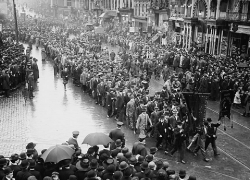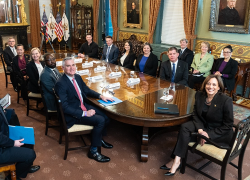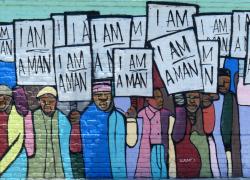
When I joined the Department of Labor as the director of the Office of Labor-Management Standards in January, I did so with a full recognition of the role played by my predecessors, most of whom – no matter the administration – shared the same guiding beliefs:
- A vibrant labor movement is essential to empowering workers to take and hold their rightful place in the economy.
- To maintain that place in the economy, it is critical that unions remain open and democratic institutions led by workers who take their service seriously and perform it honestly so workers and the public more broadly have confidence in their integrity.
- Employers’ efforts to enlist outsiders to keep workers from organizing should be made public.
Despite our (more or less) shared agenda, none of my predecessors shared my background or the unique set of influences that shaped my perspective and led me to this role. Since I expect to write and speak about OLMS’s mission, the role of unions and the relationship between the two in the years ahead, I thought it important to let readers judge my views in the context of my life experiences.
As a young man coming of age in the late 1960s, the forces of social unrest pushed me – slowly, inexorably and without my really realizing it – in the direction of the social justice movement. It was then, while in law school, that I decided to pursue a career focused on addressing the deep societal inequities that I was witnessing for the first time. I began by clerking for a federal district court judge who, without hesitation, ruled that certain restrictions on social welfare programs violated the equal protection clause of the Constitution. The same judge also ruled that the conditions of pre-trial detention in Alameda County’s notorious Santa Rita jail violated the cruel and unusual punishment clause.
Following my clerkship, I served as a legal assistant to a commissioner on the Federal Communications Commission who believed that the airwaves (and later cable television channels) belonged to the people and not to the corporations who were supposed to be temporary guardians of those precious assets.
After a year at the FCC, I left the government and spent five years at the D.C. Public Defender Service representing the most vulnerable citizens of the District of Columbia, who, generally as a result of the unrelenting forces of poverty, found themselves as criminal defendants in the D.C. Superior Court.
So it is no surprise that starting in 1977 I began what was to become a 40-year career representing local and national labor unions as they sought to improve the lives of the millions of members they represented.
Everyone’s viewpoints and actions are all, to one degree or another, shaped by their history, and I am no exception. I bring to this job the fierce belief that, while enforcement of the Labor-Management Reporting and Disclosure Act of 1959 is our principal mission, enforcement only serves to strengthen the labor movement – and does not and cannot overshadow the important service unions engage in to make our society work in the interest of working people.
I also carry the knowledge that, although we find occasional criminal conduct by union officers and employees and occasional violations of the law governing union elections, the vast and overwhelming majority of those officers and employees do their jobs exactly as they are supposed to, for unselfish reasons, and the vast majority of union elections are held without incident.
In partnership with the White House Task Force on Worker Organizing and Empowerment, we in OLMS are committed to serving the workers whose interests we represent with this common understanding of the important role unions have played and continue to play in the American economy. To this end, my vision for OLMS includes:
- Continuing our critical enforcement and educational activities.
- Expanding the scope of our public reporting functions, to improve transparency and the public’s understanding of OLMS data and other data that reflects on the forces that shape the American workplace.
- Rebooting the affirmative labor-management relations and cooperation programs we have historically sponsored and advanced at the Labor Department.
In the months ahead, I look forward to working with Secretary Walsh and my colleagues to advance the integrity – and with it, the mission – of the labor movement in the modern American economy, and to sharing updates and musings along the way. Please learn more about OLMS at www.dol.gov/agencies/olms/about.
Jeffrey Freund is the director of the Office of Labor-Management Standards.

 U.S. Department of Labor Blog
U.S. Department of Labor Blog





